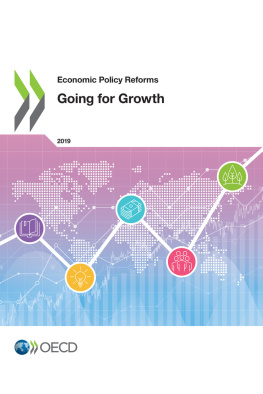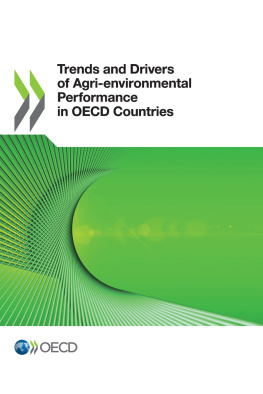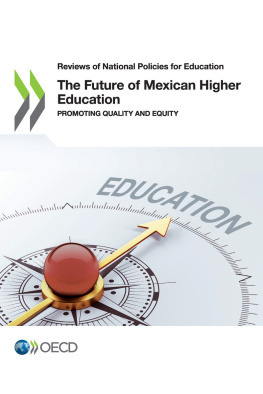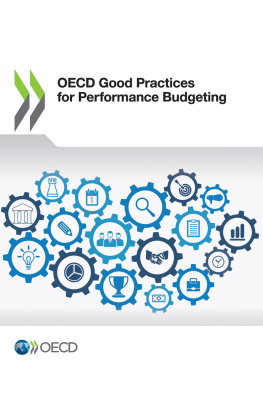OECD - Benchmarking Higher Education System Performance
Here you can read online OECD - Benchmarking Higher Education System Performance full text of the book (entire story) in english for free. Download pdf and epub, get meaning, cover and reviews about this ebook. year: 2019, publisher: OECD Publishing, genre: Politics. Description of the work, (preface) as well as reviews are available. Best literature library LitArk.com created for fans of good reading and offers a wide selection of genres:
Romance novel
Science fiction
Adventure
Detective
Science
History
Home and family
Prose
Art
Politics
Computer
Non-fiction
Religion
Business
Children
Humor
Choose a favorite category and find really read worthwhile books. Enjoy immersion in the world of imagination, feel the emotions of the characters or learn something new for yourself, make an fascinating discovery.
Benchmarking Higher Education System Performance: summary, description and annotation
We offer to read an annotation, description, summary or preface (depends on what the author of the book "Benchmarking Higher Education System Performance" wrote himself). If you haven't found the necessary information about the book — write in the comments, we will try to find it.
OECD: author's other books
Who wrote Benchmarking Higher Education System Performance? Find out the surname, the name of the author of the book and a list of all author's works by series.
Benchmarking Higher Education System Performance — read online for free the complete book (whole text) full work
Below is the text of the book, divided by pages. System saving the place of the last page read, allows you to conveniently read the book "Benchmarking Higher Education System Performance" online for free, without having to search again every time where you left off. Put a bookmark, and you can go to the page where you finished reading at any time.
Font size:
Interval:
Bookmark:

OECD (2019), Benchmarking Higher Education System Performance , Higher Education, OECD Publishing, Paris, https://doi.org/10.1787/be5514d7-en .
The scope of contemporary higher education is broad, and concerns about the performance of higher education systems are widespread. The number of young people with a higher education qualification is expected to surpass 300 million in OECD and G20 countries by 2030. Higher education systems are faced with many challenges, which include expanding access, containing costs, and ensuring the quality and relevance of provision.
During 2017-2018, the OECD Higher Education Policy team carried out a benchmarking review of higher education systems. The review involved the compilation and analysis of statistical data related to higher education (ISCED levels 5-8) for all OECD countries, as well as a review of indicators, policies and practices for four jurisdictions that elected to participate in a deeper benchmarking exercise: Estonia, the Flemish Community of Belgium, the Netherlands and Norway. The evidence compiled for the review spanned the inputs, activities, outputs and outcomes of higher education systems, with a view to assessing their relative performance.
The analysis in this synthesis report for the project provides a comprehensive and empirically rich review of the higher education landscape across OECD countries, taking stock of how well systems are performing in meeting their education, research and engagement responsibilities. This report represents the first extensive examination of higher education systems undertaken by the OECD in more than a decade, and is timely given the continuing shifts in the higher education landscape in recent years. It presents an analysis of the state of higher education across the OECD today; the wider context in which it operates; how it is resourced; outputs and outcomes of education and research activities; and the range of actions higher education institutions are increasingly taking to improve engagement with the wider world and their relevance to society.
This review also finds that the necessary evidence base to guide higher education policy is trailing behind the quickly moving developments in higher education systems. While higher education is by far the most internationalised level of education, with systems competing globally for students and researchers, there are almost no international comparisons available of how teaching, learning and research are organised within the black box of higher education institutions.
Furthermore, higher education grows more costly every year. Yet, despite continuously increasing public and private expenditure, the body of available evidence required to measure the value achieved for this investment is less developed compared to other levels of education. Tackling core data gaps on the quality of education services provided and the impact of higher education on students development of skills and knowledge is essential to demonstrate the value provided by higher education systems and illuminate the areas in which performance needs to be improved.
This publication was developed by the OECDs Higher Education Policy team in the Directorate for Education and Skills. Chapter authors include Patricia Akamp, Ana Godonoga, Gillian Golden, Monica Hanssen, Shizuka Kato, Gabriele Marconi, Shane Samuelson and Cludia Sarrico. Massimo Loi and Gabriele Marconi developed the statistical framework for the project, and Massimo Loi provided statistical support. The report was compiled and prepared for publication by Gillian Golden, Shizuka Kato and Gabriele Marconi; and edited by Cassandra Morley. Rachel Linden provided valuable support in the editorial and production process. The project was planned and initiated by Cludia Sarrico, and completed under the supervision of Gillian Golden. Their work was led by Shane Samuelson and Thomas Weko; and carried out with the advice of Dirk van Damme, Deborah Roseveare and Paulo Santiago.
The authors are grateful for the input, feedback and support received from colleagues across the Directorate for Education and Skills: Etienne Albiser, Theodore Berut, Elian Bogers, Nora Bruning, Eric Charbonnier, Michele Cimino, Marie-Helene Doumet, Victoria Galn-Muros, Corinne Heckmann, Andrea-Rosalinde Hofer, Margarita Kalamova, Liam Lynch, Patricia Mangeol, Andrew McQueen, Camila de Moraes, Simon Normandeau, Gara Rojas Gonzalez, Simon Roy, Daniel Sanchez-Serra, Markus Schwabe, Giovanni Semeraro, Van Truong Thuy, and Aleksandra Zivkovik. The authors are also grateful to Funda Grr and Cassandra Morley for their administrative support and to colleagues in the Public Affairs and Communications Directorate for their support during the publication process.
The authors also drew on expertise and assistance from colleagues working across the OECD, including Mario Cervantes, Fernando Galindo-Rueda, Brigitte Van Beuzekom (Directorate for Science, Technology and Innovation), Ricardo Espinoza (Centre for Skills) and Raffaele Trapasso (Centre for Entrepreneurship, SMEs, Regions and Cities).
Guidance for the work of the Secretariat was provided by the members of the Informal Working Group on Higher Education, and especially by representatives of the four countries participating in the project:
Estonia: Kristi Raudme (national coordinator), Klli All, Tiina Annus, Kristel Bankier, Martin Eessalu, Margus Haidak, Terje Haidak, Ingrid Jaggo, Hanna Kanep, Marianne Leppik, Ivi Lillepuu, Rein Kaarli, Tiiu Kreegipuu, Katrin Mandra, Allan Padar, Sander Pelisaar, Katrin Pihor, Kristi Ploom, Janne Pukk, Kristel Rillo, Mariann Saaliste, Signe Uustal, Kristel Vaher, Sigrid Vaher and Aune Valk.
Font size:
Interval:
Bookmark:
Similar books «Benchmarking Higher Education System Performance»
Look at similar books to Benchmarking Higher Education System Performance. We have selected literature similar in name and meaning in the hope of providing readers with more options to find new, interesting, not yet read works.
Discussion, reviews of the book Benchmarking Higher Education System Performance and just readers' own opinions. Leave your comments, write what you think about the work, its meaning or the main characters. Specify what exactly you liked and what you didn't like, and why you think so.


















